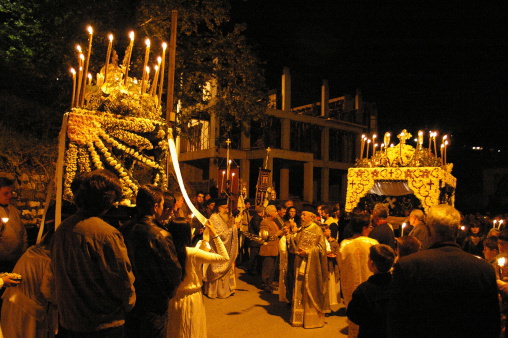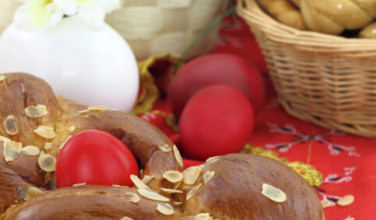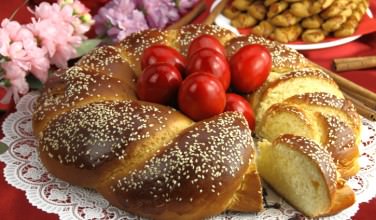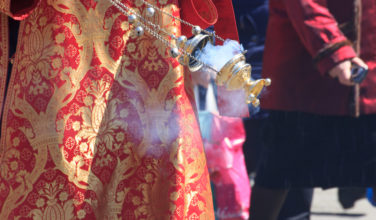An Overview of Greek Orthodox Holy Week
Comments Off on An Overview of Greek Orthodox Holy Week
 In the Orthodox Christian Church, Great Lent and Holy Week are two separate things. Officially, Great Lent ends on the Friday before Palm Sunday, and Holy Week begins the day after that. Each day during Holy Week has a special meaning, and understanding what each day represents can help making attending all those church services a lot more meaningful!
In the Orthodox Christian Church, Great Lent and Holy Week are two separate things. Officially, Great Lent ends on the Friday before Palm Sunday, and Holy Week begins the day after that. Each day during Holy Week has a special meaning, and understanding what each day represents can help making attending all those church services a lot more meaningful!
It’s also customary to fast throughout Holy Week. For many, they adhere the same general fasting plan they had during Great Lent. Others make their Holy Week fast a little bit more strict. Talk with your priest so that you can come up with a fasting schedule that best meets your own spiritual needs.
Here is an overview of the meaning behind each of the days of Holy Week and the types of church services you’ll be able to attend:
Lazarus Saturday
Lazarus Saturday is celebrated in remembrance of the day Lazarus, a friend of Jesus, was brought back from the dead. As you may recall, Lazarus was dead for four days before Jesus brought him back. The entire story is covered in the Book of John in Chapter 11. Specifically, the story of him being brought back from the dead can be found in John 11:38-43.
On Lazarus Saturday, churches usually have a Matins Service, which is what the “morning church service” is referred to as, followed by the Divine Liturgy, which is the standard service that we follow on Sundays. There could also be Evening Vespers.
Palm Sunday
Palm Sunday is also referred to as the Services of Our Lord’s Entry into Jerusalem. This is when Jesus arrived in Jerusalem and the people declared him as their King. This event was so important, it is covered in each of the Four Gospels. Please visit Matthew 21, Mark 16, Luke 19, and John 12 for more information about this. Shortly after his Triumphant Entry, Jesus predicted His death. This can also be found in John 12.
Palm Sunday takes place on a Sunday, which means that the regularly Divine Liturgy is celebrated at the regular time for your church. However, the service does include a few extra elements, which emulate His Entry into Jerusalem. Churches also have an evening services referred to as the Bridegroom Services.
Holy Monday
Holy Monday is considered the third day of Holy Week. For each of the first three days, there is a general theme. These are the days that set the stage for Christ’s death and resurrection, which takes place later on in the week. On this day, we commemorate Joseph the Patriarch, the son of Jacob (from the Old Testament). This is also the day that the church remembers the moment that Jesus cursed the fig tree on his way into Jerusalem during His triumphant entry.
There is typically an Orthos Service on Holy Monday. However, some people have the Bridegroom Services on the evening of Palm Sunday, instead. Some churches actually have both services.
Holy Tuesday
Most churches do have a Matins service on Holy Tuesday, which is designed to prepare us for the events of Holy Wednesday. Special hymns are sung on Holy Tuesday and many churches enlist their choir for help singing these hymns. One of the special hymns is called “Hymn of Cassiane” and it has a beautiful, haunting melody. This service usually takes place in the evening.
Holy Wednesday
There are usually two church services that take place on Holy Wednesday, one in the morning and one in the evening. In the morning, the Liturgy of the Presanctified Gifts is usually celebrated. This is one of the only opportunities people have during Holy Week to receive Holy Communion. There is usually another service in the evening where people may receive Holy Unction.
The focus during the services of Holy Wednesday are of repentance and confession, and the oil is said to be very healing. This day commemorates the day that Christ’s feet were anointed with myrrh. You can read about this in Gospel of Luke, Chapter 7.
Holy Thursday
Holy Thursday begins the final events that leads to the Lord’s Passion. On this day, the Mystical Supper, also called the Last Supper, is celebrated. You can read about the Last Supper in several places throughout the Bible including in Mark 14, Luke 22, and John 15.
There are typically two services that take place during Holy Thursday – one in the morning and one in the evening. Much of the evening service is spent preparing for Good Friday. This is the day where He was sentenced to death and nailed on the cross.
Good Friday
On Good Friday, Orthodox Christians commemorate the moment Jesus died on the cross. During the afternoon service, Jesus is taken off the cross and laid in the tomb (Epitafio). During evening service, we mourn his death, read Bible passages, and sing hymns. In the evening, the priest and those who serve in the altar make a procession around the church. Many churches actually take the Epitafio outside of the church and make a procession around the church neighborhood. In many parishes, flower girls throw rose petals on Jesus’s body. This procession represents Jesus entering Hades.
Holy Saturday
During Holy Saturday, we essentially mourn Christ’s death. There are several church services throughout the day, but the most important one takes place in the evening. For several hours before midnight, we sing hymns and spend time in church, anticipating His resurrection. A few minutes before midnight, the church gets quiet and goes dark. Finally, the church erupts in candlelight and the traditional hymn, Christos Anesti, or Christ is Risen, is sung.
Pascha
This is the day we celebrate Christ’s Resurrection. The Holy Saturday evening service overlaps with Easter Sunday. There is also a regular Divine Liturgy service on the morning called the Agaph service. However, this differs depending on the church. Most families spend the day together, celebrating into the late hours of the day. For most Greek people, this is the biggest holiday of the year and the celebrations are usually quite festive!
If you’re interested in attending the Holy Week services, check with your parish for a list of the services they will be having as well as the times.
Sources:
Matins – Orthodox Church of America
The Divine Liturgy – Orthodox Church of America
Lent – Greek Orthodox Archdiocese
Categorized in: Greek Easter Traditions
This post was written by Greek Boston





